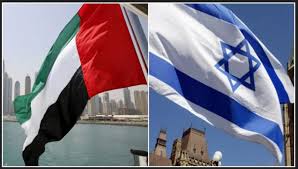There is nothing 'historic' in the peace agreement, brokered by US President Donald Trump, between Israel and the UAE on Thursday, August 14, as the two countries had been very closely working on issues of intelligence and security cooperation for the last two decades.
Primarily, there are two reasons why the UAE started gravitating towards Israel. First, is the emergence of Iran as a regional power after the Islamic revolution. Such a powerful neighbour, both militarily and diplomatically, made the UAE uneasy given its minuscule clout in the region and insignificant military power. The UAE already had a territorial dispute with Iran.
On November 30, 1971, after the British forces withdrew from the three UAE islands of Abu Musa and the Greater and Lesser Tunbs in the Strait of Hormuz they were seized by the Imperial Iranian Navy.
Second and more importantly is the emergence of Abu Dhabi Crown Prince Sheikh Mohammed bin Zayed al Nahyan as the de facto ruler of the UAE. Although his aged and sick older brother Sheikh Khalifa bin Zayed al Nahyan is the ruler of Abu Dhabi, it is MBZ as Sheikh Mohammed is popularly known, who runs the UAE.
The advent of the Arab Spring, the rise of the Muslim Brotherhood in Egypt and the emergence of ISIS in the Middle East had sent alarming bells ringing in Abu Dhabi.
At a time when the entire Middle East was in turmoil, the UAE had remained an oasis of peace but the presence of a large number of Iranians, who are citizens of the UAE and a huge Arab expat workforce forced the Sandhurst-trained MBZ to clamp down on the expats and the UAE nationals, who were sympathetic to Islamist outfits, especially the Muslim Brotherhood.
The concern about national security pushed the UAE further into Israeli embrace and the Jewish state was more than willing to provide phone-hacking technology to spy on political activists and the media. Shutting down WhatsApp and Skype was not enough as the UAE needed more potent spyware to hack into phones of human rights activists, dissidents and a shadowy Egyptian group, more radical than the Muslim Brotherhood, whose members were working as teachers in the UAE schools.
In 2013, Israel allowed Herzliya-based NSO Group to supply Pegasus spyware program to the UAE which turns smartphones into listening devices. Since Israel considers Pegasus a weapon the company needs express permission from the defence ministry to sell the software, which in the UAE's case was duly granted.
Later, came ToTok, a duplication of YeeCall, a Chinese social app, which too had Israeli connection. The app, which became one of the top 50 free messaging platforms on Google Play store, was developed by UAE’s notorious DarkMatter, which helped the country’s intelligence agency by supplying crucial information about dissidents, journalists and human rights activists by hacking their phones and other communication devices.
DarkMatter was established by Faisal al Bannai, the owner of Axiom Telecom, whose father had served as general in the UAE army. Faisal had very close ties with former members of Israeli intelligence agencies and had visited Israel several times. Israeli newspaper Haaretz reported that with the help of these intelligence officials, DarkMatter not only hacked its UAE citizens but also hacked government ministries from other countries including Iran, Turkey and Qatar. In return, these Israeli officials earned up to $1 million annually.
After this, the UAE started courting Israel openly. In December 2019, the UAE Foreign Affairs and International Cooperation, Sheikh Abdullah bin Zayed Al Nahyan, younger brother of MBZ, retweeted from his personal account an article about Israel, Arab alliance.
The article was written by Ed Husain, a former member of Hizut Tahrir, an pan-Islamist fundamentalist organization. In the article, which appeared in The Spectator, the Islamist-turned-reformist Husain, wrote how the Iranian threat is forging a new Arab-Israeli alliance in the Middle East. Israeli Prime Minister Benjamin Netanyahu responded by welcoming ties between the Jewish state and Arab states and added: “The time has come for normalization and peace.”
The precursor to the peace deal was an op-ed article written by the UAE Ambassador to the US, Yousef al-Otaiba, in Hebrew in Yediot Ahronot urging the Israeli public to stop Netanyahu from the unilateral annexation of the West Bank and the Jordan Valley. Yousef, who is considered to be very close to MBZ, warned that the move would destroy any hopes for further rapprochement between the Jewish state and the Arab world.
A senior political analyst based in Dubai, who does not want to be named, says the Iranian threat has helped forge a new troika in the Middle East, especially after China's $400 billion economic and security deal with Iran, which is bound to upset the equilibrium in the Persian Gulf.
"The UAE-Israeli ties have been an open secret for a long time. Interestingly, both the countries never shied away from giving hints that they have deep strategic and security relations. However, the timing was very crucial as both countries needed something tangible to sell the agreement to their people. Netanyahu's annexation, which was already in limbo, came in handy for the two countries to call it a win-win deal," he said.
The deal will definitely boast the stature of MBZ in the region as the UAE is claiming that the agreement has forced Israel to stop the annexation plan, meaning that it has come to the rescue of Palestinians at his crucial time.
For Netanyahu it is a diplomatic coup of sorts as it will help improve Israel's ties with the West and much of the Arab world and at the same time it has put hawkish Netanyahu in the league of Menachem Begin and Yitzhak Rabin, who signed peace accords with Egypt and Jordan, he added.
The UAE is not the first Persian Gulf state to establish ties with the Jewish state. Late Sultan Qaboos bin Said, the ruler of Oman, was the first Gulf leader to come out in the open about diplomatic relations with Israel when he sent his foreign minister Yusuf bin Alawi bin Abdullah to attend the funeral of the then Israeli Prime Minister, Yitzhak Rabin, who was assassinated during a public rally in 1995.
Asif Ullah Khan


